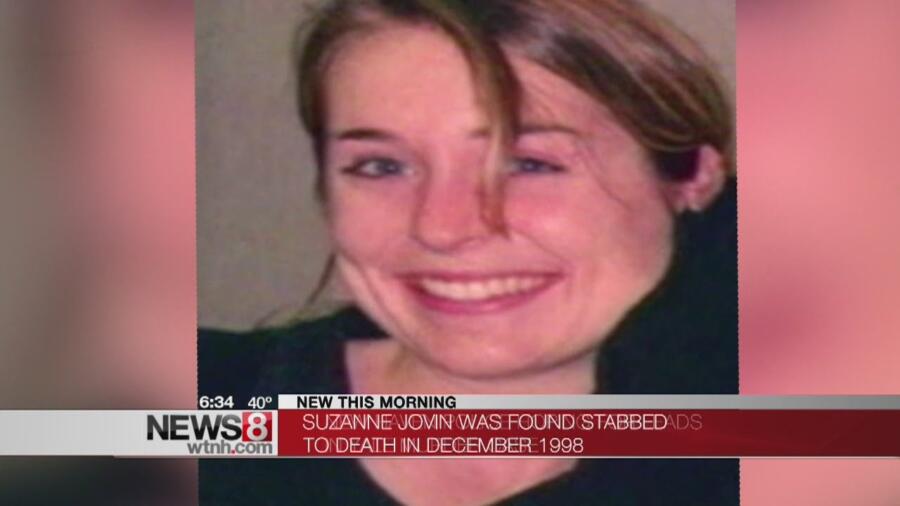The Victim
Suzanne Jovin, 21, a political science major at Yale, described by friends as beautiful, smart, and compassionate. She volunteered often and was director of Best Buddies, a charity working with intellectually and developmentally disabled adults.
The Crime
On an unseasonably warm winter day in New Haven on December 4, 1998, Jovin finished cleaning up after a pizza party for Best Buddies. A friend who saw her on campus at about 9:25 PM recalled that she said she was very tired. She also mentioned needing to pick up some borrowed GRE study materials. Around a half-hour later, she was found about two miles away from campus with multiple stab wounds to her head and neck. Passersby and neighbors said they heard a woman’s screams. The 911 call came in just before 10 PM. Jovin died at Yale New Haven Hospital later that night.
The Evidence
The knife tip of the murder weapon was found lodged in Jovin’s skull. Reportedly a Fresca bottle with Jovin’s fingerprints was near her body, and DNA was recovered from under her fingernails. The distance from where Jovin was last seen was almost two miles. The police say it was virtually impossible for her to walk or run there, so they think she was driven there, likely by someone she knew. A tan or brown van was seen parked near where her body was found.
The Investigation
The parents: In 1999, Suzanne’s mother Donna wrote an open letter to local newspapers begging the killer’s mother to come forward. “Only you can imagine the pain and anguish which I have felt,” she wrote. In 2009, both parents wrote a letter (that was much covered in the press) to Connecticut Governor M. Jodi Rell asking her to help rectify what they saw as the shortcomings of the state forensic lab.
The Jovin Investigative Team: In 2007, the New Haven State Attorney gathered a group of retired Connecticut State Police detectives to delve into the cold case (they’re still on it — as unpaid consultants). In 2014, the Team (which includes representatives from the New Haven police, the Division of Criminal Justice Cold Case Division, and the Office of New Haven State’s Attorney) held a community meeting asking locals for leads.
Her teacher: Soon after the murder, police looked at James Van de Velde, a Yale Class of ’82 graduate and a lecturer in the Political Science department. He was also Jovin’s senior essay advisor. On his Linkedin profile, Van de Velde describes himself as a “cyber warfare, WMD and counterterrorism analyst…” With police naming him as a suspect, Yale dropped his classes that spring. Van de Velde was never charged, and later sued both the university and the city of New Haven for damage to his reputation. According to a New Haven Register article, the city and Yale agreed to settle in 2013.
The “running man“: David Cameron, a political science professor at Yale and a member of the state’s Eyewitness Identification Task Force (established to examine issues related to criminal lineups), has studied and written about the case. “The investigation continues,” he wrote to A&E in an email. He thinks that it’s “pretty obvious” who did it: the “running man.” An eyewitness saw a man running across Whitney Avenue and told the police shortly after the murder, according to published reports. The team of former state police investigators had a police artist sketch made. “The woman was a thoroughly reliable witness but the police at the time (and thereafter) wrote her off as uncooperative for several reasons,” Cameron told us. Cameron believes that one reason could be that she did not identify James Van de Velde as the runner.
Her senior essay: Another theory buzzing around the web was that Jovin’s senior essay on Osama bin Laden had something to do with her murder. She had handed in a final draft to Van de Velde on that last day. This has spawned blogs posts and speculative comments that her murder was somehow related to 9/11.
A troubled grad student: Others have seized upon as a suspect a (unnamed in the press) Yale School of Architecture grad student who reportedly told friends he was “obsessed with” Jovin’s murder. The student died in a car accident or potential suicide in 2012. The two were not known to be acquainted.
The GRE study buddy: Another lead seems to be the so-far-unidentified person from whom she was retrieving the borrowed GRE exam prep materials that night.
Where it Stands
Jovin’s friends and members of the Yale community have continued to commemorate the anniversary of her death, according to the Yale Daily News. In what looks like a studio yearbook photo, she smiles prettily from the cold case file on the website of the Connecticut Division of Criminal Justice. The caption reads: “We are interested in all available information or leads, no matter how remote or trivial that information may seem…We want to hear from anyone who has heard something, seen something, or may even have repressed the knowledge of something” related to the murder.
Next year [2018] will be the 20th anniversary of Suzanne Jovin’s death. Yale and the state of Connecticut are offering a reward of up to $150,000 for information leading to the arrest and conviction of her killer.
(Image: News 8 /Getty Images)


